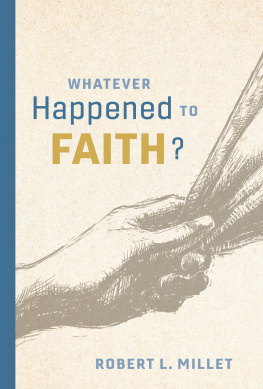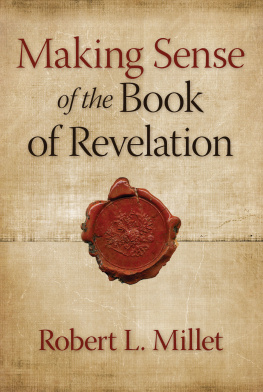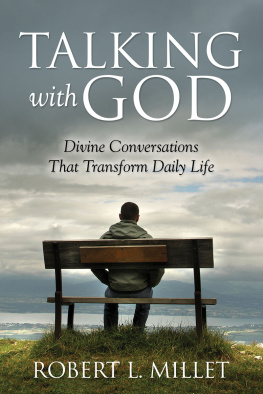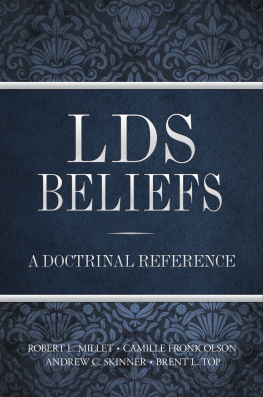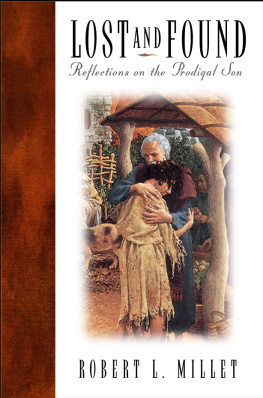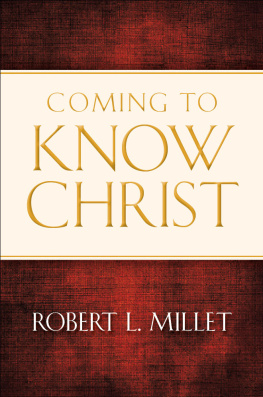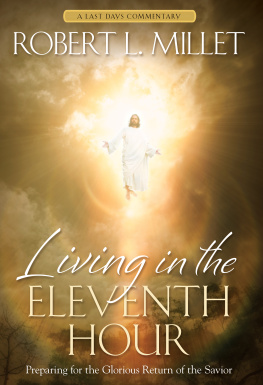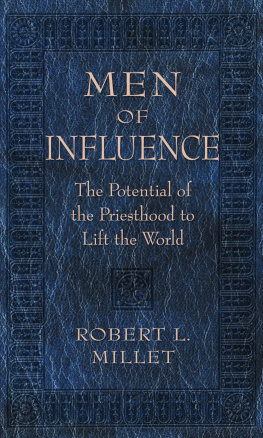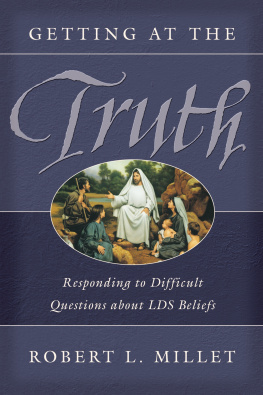When a Child Wanders
Robert L. Millet
1996 Robert L. Millet.
All rights reserved. No part of this book may be reproduced in any form or by any means without permission in writing from the publisher, Deseret Book Company (permissions@deseretbook.com), P.O. Box 30178, Salt Lake City Utah 84130. This work is not an official publication of The Church of Jesus Christ of Latter-day Saints. The views expressed herein are the responsibility of the author and do not necessarily represent the position of the Church or of Deseret Book. Deseret Book is a registered trademark of Deseret Book Company.

Buy Coming to Know Christ here.
Buy Talking With God here.
Who are these straying sheepthese wayward sons and daughters?
They are children of the Covenant, heirs to the promises, and have received, if baptized, the gift of the Holy Ghost, which makes manifest the things of God. Could all that go for naught?
ORSON F. WHITNEY
PREFACE
It is a glorious thing to observe young people as they begin to respond to the promptings of the Spirit, grow in spiritual graces, and become productive and contributing members of the kingdom of God on earth. Nothing brings more satisfaction to parents or loved ones than watching the youth of the Church become all that they were meant to become. But tragically, some of the rising generation do not reach for the rod of iron, do not follow the examples of parents or Church leaders, do not acquire the conviction or develop the commitment to the Church that we had anticipated. Some children drift aimlessly, remaining only a stone's throw away from full activity; others vigorously turn away from time-honored values and embrace the ways of a degenerate world.
This work focuses on the phenomenon of wandering children. It is not meant to make us all feel a little better in knowing that others share our pain. It is, rather, a call for us to have hopehope for the future, hope for those who now seem so hopeless, hope for reconciliation and reunion. Such hope is not based on the power of positive thinking, though it is good to be positive; it is, rather, based on doctrinesound, solid doctrinedoctrine from the prophets that offers us true and lasting hope for the future in the face of present ills and challenges with our children or other loved ones.
So much of our hopelessness stems from our inability to comprehend and thus lay hold on the grand prophetic promises that await those who are true and faithful to their covenants. In so many matters that matter, Joseph Smith the Seer has opened celestial windows and beckoned the Saints of the Most High to gaze with him upon the scenes of eternity. He has called upon us to repent of small-mindedness and broaden our horizons. As a supernal comfort to those whose children wander for a season, he implores us to search the scriptures, ponder the revelations of God's covenant spokesmen, and believe the soothing word regarding the power of the gospel covenant. This book seeks to point us toward those consummate blessings that can be ours if we trust in and rely upon the Lord Jesus, the Mediator of the Covenant. It is an invitation for us to focus on things that matter mostcovenants, ordinances, families, sealing power, and righteousness. That all who read these pages may feel to glory in the power of the gospel and thereby rejoice in "the testimony of the covenant" (D&C 109:38), is my sincere prayer.
In the preparation of this work, I am deeply indebted to many who offered counsel, consolation, and references, as well as others who helped to sharpen my focus on this singularly significant doctrinal theme. It is always a bit awkward to mention specific people, but I express particular thanks to my colleagues Larry E. Dahl, Leon R. Hartshorn, E. Dale LeBaron, Robert J. Matthews, Joseph F. McConkie, Keith W. Perkins, Rex C. Reeve Jr., Stephen E. Robinson, M. Catherine Thomas, and Brent L. Top. I am indebted to Lori Soza, a dedicated and competent secretary and assistant, for her knowledgeable assistance in preparing the manuscript for publication. I acknowledge also the encouragement of Sheri Dew of Deseret Book Company and especially the keen and caring editorial eye of Suzanne Brady; Suzanne has simply made this a better book. Though I am indebted to so many for so much, I alone am responsible for the conclusions drawn from the evidence cited. This book is a private endeavor and thus not an official publication of either The Church of Jesus Christ of Latter-day Saints or Brigham Young University.
PROLOGUE
Most of us enter upon family life with grand expectations and high hopes. We feel secure that if we simply do our jobs properlyattend church, study the scriptures and pray as individuals and families, hold family home evenings, pay our tithing, love and serve one another and those within our communityhappiness and joy will flow into our lives. We teach our children the principles of the gospel, kneel in prayer with them, participate in mother-daughter activities and Pinewood Derbies, and feel confident that in the end we will enjoy the fruits of our laborsthat each little boy and each little girl will grow up with the same depth of testimony and the same level of commitment to God and the restored gospel that we as parents or loved ones have.
Most of us anticipate that our little ones will grow up to be faithful and participating Latter-day Saints. We believe that our children will be involved in all of the programs of the ChurchYoung Women recognition, Eagle Scout awards, seminary graduation, institute of religion enrollment, and so on. When things do not materialize as we had planned and when some of our long-held goals for the children are definitely not being achieved or even pursued, the stark realities of life set in. Life doesn't always turn out exactly as we had planned.
The phenomenon of wandering children and the trail of attendant sorrows are no respecter of persons. They make their way into the homes of rich and poor, active and less active, functional and dysfunctional. They raise their ugly heads in families led by single parents as well as in families presided over by bishops and stake presidents. They take their toll on abusive and negligent mothers and fathers as well as on mothers and fathers of faith, people who are sincerely trying to do what's right.
Many Latter-day Saint families have become intimately acquainted with heartache and suffering and agony and a roller coaster of emotions. They have felt the despair that comes from seeing loved ones violate their covenants, turn away from what they have been taught, and despise what they once loved. Parents cringe as they watch their precious young people close doors of opportunity to themselves through foolish choices. Many mothers and fathers come to know some things quite wellwhat it means to pour out their souls to God in prayer in behalf of loved ones; how to fast with real intent; the inestimable value of attending the temple in a search for solace; how to love when it seems so natural to hate, to be firm when it would be so much easier to crumble; and how to face each day and keep going through the divine grace or enabling power that the Great Physician promises to those who mourn.
I confess that I do not have the solutions to such vexing problems, but I have wrestled intensely with the questions. I know what it feels like to be haunted by feelings of inadequacy in dealing with my children, to browbeat myself for not being more faithful as a parent on this or that issue, to wonder at weak moments if it's all worth it. I assure you that I would much rather have learned some of the harsh lessons of family life by reading of the experience of others. But there are some things we cannot go around; we must go through. And through it all, through the tears and the toil and the torturous interrogation of the heart, there comes the quiet assurance that the God of heaven knows and cares. He knows perfectly. He cares deeply and profoundly.


